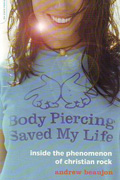
Andrew Beaujon
Reviewed by: Brent Ferry
Body Piercing Saved My Life: Inside the Phenomenon of Christian Rock, by Andrew Beaujon. Published by Da Capo Press, 2006. Paperback, 291 pages, list price $16.95. Reviewed by OP pastor Brent Ferry.
The senior contributing writer for Spin magazine, Andrew Beaujon, has written Body Piercing Saved My Life: Inside the Phenomenon of Christian Rock for anyone who loves rock music. Beaujon writes a chronicle, in the style of rock music journalism, about his attempt to understand the Christian music subculture. He is sympathetic and critical, offering a well-informed appraisal based on solid research and journalistic footwork.
Beaujon travels from one Christian music venue to another, trying to secure interviews with artists through publicists who are too polite to say no, yet not interested enough to grant an interview. Some of the interviews he does secure end up strained by the artists' unwillingness to speak about their faith (not wanting to alienate a broader audience). Beaujon puts his finger on the conflicted psychology of evangelicals who, in trying to entertain themselves and evangelize others at the same time, are not always comfortable in their own skin.
The book highlights five interviews, among many others, with "Christian Rock Lifers," people who have a long history in the industry: Doug Van Pelt (the founder of HM: The Hard Music Magazine), Steve Taylor, Jay Swartzendruber (editor of CCM magazine), Bill Hearn (president and CEO of the EMI Christian Music Group), and Mark Salomon (of the Crucified). The reader follows Beaujon from the Cornerstone Music Festival to the headquarters of Tooth & Nail Records in Seattle, to Dave Bazan's castle, to Mark Driscoll's Mars Hill Church, to the Gospel Music Association Week in Nashville, to the Gospel Music Awards, and more.
In chapter 6, the author recounts his attendance at Calvin College's Festival of Faith and Music, where he is introduced Dutch Calvinism's meanderings about Christ and culture, the legacy of dispensational premillennialism, Franky Schaeffer, the emerging church movement, and more.
Beaujon's description of "worship music" is worth reading. He says, "I can't imagine anything worse than being forced to pay for my salvation by listening to worship music for the rest of my days." "It's more than a little sexual and a tad uncomfortable if you are sitting next to an attractive person who's been overcome by the Spirit." "Worship tunes tend to evince an adolescent theology, one that just can't get over how darn cool it is that Jesus sacrificed himself for the world." "After an hour I could barely feel my head" (pp. 158-60).
Beaujon says the book is "about whether Christian music can figure out how to transform itself from being simply a lifestyle accessory to becoming an enduring part of American culture" (p. 43). But the book seems more about Andrew Beaujon's realization that evangelical Christianity is not a shallow, doctrinal mono-culture, but a complex, conflicted community in which music is the public square (p. 268). The book has cuss words in it, but I am going to read it again.
March 30, 2025
On the Trail with a Missionary
March 23, 2025
Midnight Mercies: Walking with God Through Depression in Motherhood
March 16, 2025
March 09, 2025
Zwingli the Pastor: A Life in Conflict
March 02, 2025
February 23, 2025
African Heroes: Discovering Our Christian Heritage
February 16, 2025
© 2025 The Orthodox Presbyterian Church